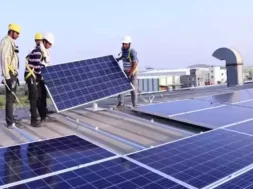
Successful and substantial conclusion of text-based negotiations of IPEF Pillar-II (Supply Chains); good progress under other Pillars – EQ Mag
Shri Piyush Goyal calls for expeditious implementation of action-oriented elements of the Agreement including mobilizing of investments in IPEF supply chains
Regional Hydrogen Initiative introduced by some IPEF partners
The second Indo-Pacific Economic Framework for Prosperity (IPEF) Ministerial Meeting was held in Detroit yesterday hosted by the US. Union Minister for Commerce and Industry, Consumer Affairs, Food and Public Distribution, and Textiles, Shri Piyush Goyal virtually participated in the Ministerial meeting.
IPEF was launched jointly by the USA and other partner countries of the Indo-Pacific region on May 23, 2022 at Tokyo. IPEF has 14 partner countries including Australia, Brunei, Fiji, India, Indonesia, Japan, Republic of Korea, Malaysia, New Zealand, Philippines, Singapore, Thailand, Vietnam & USA. It seeks to strengthen economic engagement among partner countries with the goal of advancing growth, peace and prosperity in the region.
The framework is structured around four pillars relating to Trade (Pillar I); Supply Chains (Pillar II); Clean Economy (Pillar III); and Fair Economy (Pillar IV). India had joined Pillars II to IV of IPEF while it has an observer status in Pillar-I.
At this Ministerial Meeting, negotiations under the Supply Chains (Pillar-II) were substantially concluded; while good progress was reported under the other IPEF Pillars. Pillar-wise Press Statement was issued at the end of the Ministerial meeting to provide an update on the developments related to text-based negotiations under each of the respective IPEF Pillars (link below).
Under the Supply Chains (Pillar-II), IPEF partner countries are seeking to: make supply chains more resilient, robust, and well-integrated through crisis response measures; cooperation for mitigation of disruptions to better ensure business continuity, and improve logistics and connectivity; promoting investments particularly in critical sectors and production of key goods; and worker role enhancement through requisite upskilling and reskilling, and increasing comparability of skills credentials frameworks across IPEF. During his intervention under this Pillar, Shri Piyush Goyal, commended the negotiating teams in delivering an expeditiously negotiated, and mutually beneficial Agreement that could propel deeper integration of economies and supply/value chains within IPEF, and urged for expeditious implementation of all the action-oriented cooperative and collaborative elements identified as part of this Agreement.
Under the Clean Economy (Pillar-III), IPEF partners are aiming to advance cooperation on research, development, commercialization, availability, accessibility, and deployment of clean energy and climate friendly technologies, and facilitate investment towards climate-related projects in the region. Further, interested IPEF partners are introducing a regional hydrogen initiative to encourage widespread deployment of renewable and low-carbon hydrogen and its derivatives in the region. During his intervention under this Pillar, Shri Goyal highlighted that India would like the Pillar focus to be centered on action-oriented elements, such as mobilization of low cost long tenure climate finance and enhanced access to clean energy technologies.
Under the Fair Economy (Pillar-IV), IPEF partners are working toward development of the text of an agreement that will strengthen implementation of effective anti-corruption and tax measures to boost commerce, trade, and investment among IPEF economies. During his intervention under this Pillar, the Minister highlighted the strong steps taken by India under the dynamic leadership of the Prime Minister Shri Narendra Modi to improve India’s legislative and administrative framework to provide a corruption free administration and reaffirmed India’s commitment to implement UNCAC and the FATF standards.










